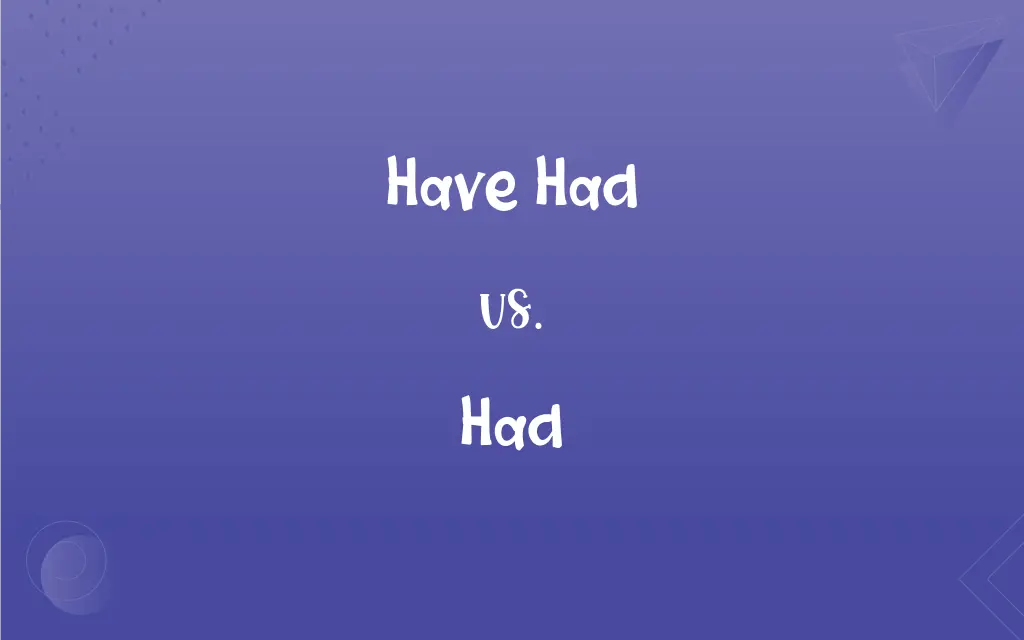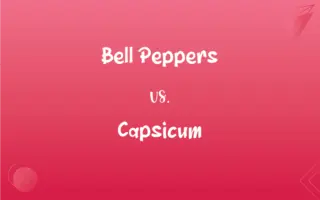Have Had vs. Had: What's the Difference?
Edited by Harlon Moss || By Janet White || Published on December 15, 2023
"Have had" is the present perfect form, indicating an action or experience that began in the past and continues to the present, while "had" is the simple past, indicating an action completed in the past.

Key Differences
"Have had" is a present perfect tense form used to describe actions or experiences that started in the past and may still be relevant or continuing into the present. For instance, saying "I have had breakfast" implies the action occurred in the past but has relevance to the present. "Had," in contrast, is the simple past tense and denotes an action or state that was completed in the past, like "I had breakfast at 8 am."
In terms of duration, "have had" suggests a link between the past and the present, often used to indicate a continuing state or repeated actions over time. For example, "I have had this car for five years" shows ongoing possession. On the other hand, "had" suggests a specific moment or period in the past with no direct implication of continuation to the present, such as in "I had a great childhood."
"Have had" can indicate experience up to the present. If someone says, "I have had many opportunities," it implies these experiences occurred throughout their life until now. Conversely, "had" focuses on a particular time in the past, as in "I had a meeting yesterday," which clearly happened at a specific past time and is complete.
The use of "have had" often conveys a sense of accumulation or ongoing relevance, such as in "They have had several warnings." It implies a buildup of experiences or actions over time. "Had," however, is more finite, marking a clear boundary in time, such as in "They had dinner and then left," indicating a completed action.
In questions and negatives, "have had" is used to ask or negate about experiences or actions extending to the present, like "Have you had lunch?" or "I haven’t had time." "Had" is used in a more straightforward past context, as in "Had you finished your work when he called?"
ADVERTISEMENT
Comparison Chart
Tense
Present perfect, linking past to present.
Simple past, only referring to the past.
Continuity
Implies continuity or relevance to the present.
Indicates a completed action in the past.
Example Sentence
"I have had this book for years."
"I had this book when I was a child."
Use in Questions
"Have you had any problems?"
"Had you seen him before that day?"
Implication
Suggests accumulation or ongoing experience.
Indicates a specific past event or condition.
ADVERTISEMENT
Have Had and Had Definitions
Have Had
Denotes accumulated experience or action.
I have had several interviews this month.
Had
Indicates past possession or state.
He had a dog when he was young.
Have Had
Used in questions about past experiences affecting the present.
Have you had lunch yet?
Had
Used to express a completed action in the past.
She had finished her work by 5 PM.
Have Had
Used to express repeated actions up to now.
We have had many meetings about this.
Had
Simple past tense of have.
They had a party last night.
Have Had
Implies ongoing possession or state.
She has had a cold for a week.
Had
Used in past perfect tense as an auxiliary.
After she had left, the phone rang.
Have Had
Present perfect form indicating past action with present relevance.
I have had the same job for ten years.
Had
Expresses a condition in the past.
If I had known, I would have come.
Had
Past tense and past participle of have.
Had
Simple past tense and past participle of have|cap=1.
This morning I had an egg for breakfast.
A good time was had by all.
FAQs
Is 'have had' used in the present perfect tense?
Yes, 'have had' is a present perfect form, combining 'have' with the past participle 'had.'
Can 'have had' refer to repeated actions?
Yes, 'have had' can refer to actions that have occurred repeatedly up to the present.
How do you form a question with 'have had'?
Form a question with 'have had' by inverting the subject and 'have,' like "Have you had breakfast?"
What does 'have had' indicate in a sentence?
'Have had' indicates an action or experience that started in the past and has relevance to the present.
When is 'had' used in English?
'Had' is used as the simple past tense to talk about actions completed in the past.
Can 'had' be used on its own?
Yes, 'had' can be a main verb in past tense sentences or an auxiliary in past perfect constructions.
Is 'have had' used in everyday conversation?
Yes, 'have had' is commonly used in everyday conversation to talk about past experiences.
What's the difference in time reference between 'have had' and 'had'?
'Have had' connects the past action to the present, while 'had' refers only to the past.
Can 'had' indicate past possession?
Yes, 'had' often indicates past possession, like "I had a car."
Can 'have had' be used for recent actions?
Yes, 'have had' can be used for actions that have recently occurred and are still relevant.
What is a common mistake with 'have had' and 'had'?
A common mistake is using 'had' when 'have had' is needed to show present relevance.
What's the role of 'have had' in indicating experiences?
'Have had' is used to talk about life experiences that have an impact on the present.
Is 'had' used in conditional sentences?
Yes, 'had' is used in the if-clause of past unreal conditional sentences.
How do you negate a sentence with 'have had'?
Negate 'have had' by adding 'not,' as in "I have not had breakfast."
Can 'had' stand alone in a sentence?
Yes, 'had' can be the main verb in a simple past sentence.
Can 'have had' express duration?
Yes, 'have had' can express the duration of an experience up to the present.
How does 'have had' affect the meaning of a sentence?
'Have had' affects the meaning by linking the past action or experience to the present context.
What tense follows 'had' in past perfect?
The past participle follows 'had' in past perfect tense constructions.
Why is it important to distinguish between 'have had' and 'had'?
Distinguishing between the two helps accurately convey the time and relevance of actions.
Is 'had' used in the subjunctive mood?
Yes, 'had' is used in the subjunctive mood in expressions like "I wish I had."
About Author
Written by
Janet WhiteJanet White has been an esteemed writer and blogger for Difference Wiki. Holding a Master's degree in Science and Medical Journalism from the prestigious Boston University, she has consistently demonstrated her expertise and passion for her field. When she's not immersed in her work, Janet relishes her time exercising, delving into a good book, and cherishing moments with friends and family.
Edited by
Harlon MossHarlon is a seasoned quality moderator and accomplished content writer for Difference Wiki. An alumnus of the prestigious University of California, he earned his degree in Computer Science. Leveraging his academic background, Harlon brings a meticulous and informed perspective to his work, ensuring content accuracy and excellence.






































































